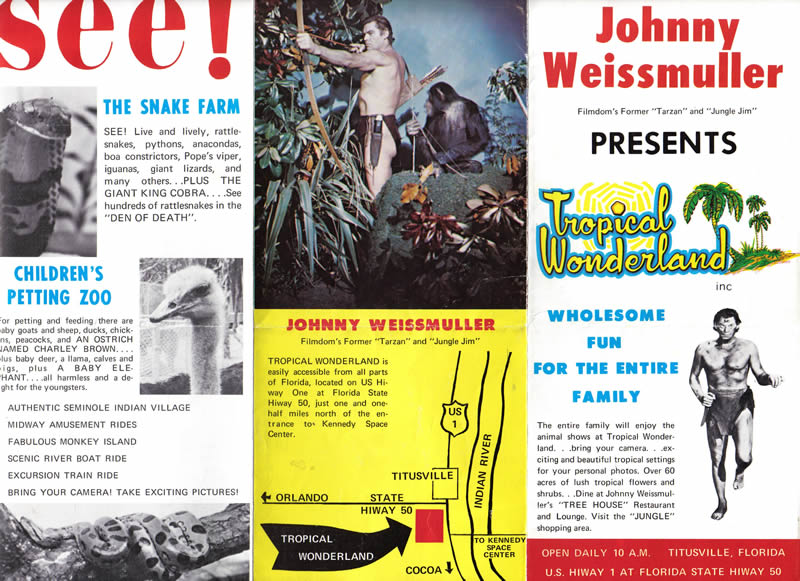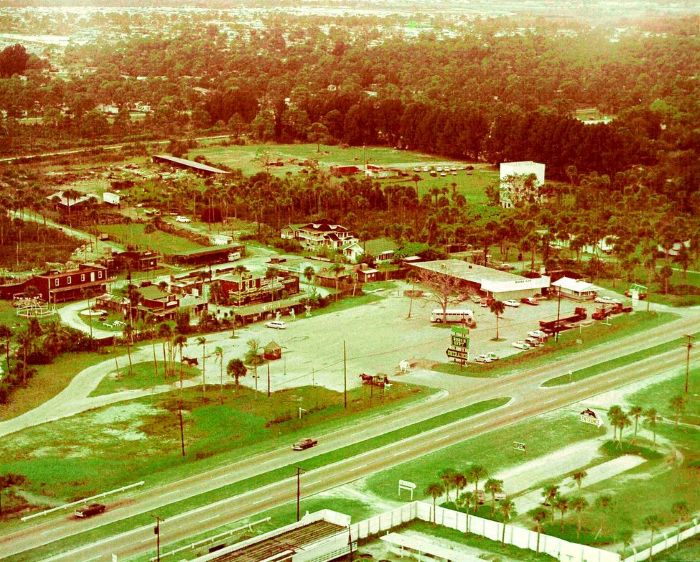- Home
- Lost Attractions
- Tropical Wonderland
TROPICAL WONDERLAND
By Mike Miller August 14, 2025
OVERVIEW
Tropical Wonderland, originally called Florida Wonderland, was a colorful roadside attraction in Titusville, Florida, located at the busy intersection of U.S. Highway 1 and State Road 50.
It operated from 1959 until 1973, offering a unique blend of animal exhibits, themed villages, small amusement rides, and live performances.
For a time, it was one of the Space Coast’s most popular family stops, drawing in visitors traveling to and from the beaches and Kennedy Space Center.
 Tropical Wonderland Poster
Tropical Wonderland PosterHISTORY
The park opened in 1959, the creation of Herbert Clay “H.C.” Kirk and his wife, under the original name Florida Wonderland.
It was designed to offer a little bit of everything—part zoo, part Wild West show, part playground—at a time when Florida’s smaller attractions thrived along the state’s growing network of highways.
In 1971, the park was renamed Tropical Wonderland and gained a celebrity boost when Johnny Weissmuller, the Olympic swimming champion and beloved Tarzan film star, endorsed it.
Weissmuller made personal appearances, posed for photos, and signed autographs, giving the park fresh attention during its later years.
FEATURES
Visitors to Tropical Wonderland could wander through themed areas that blended entertainment with a touch of theatrical drama.
One highlight was Dodge City, an Old West town modeled after the television series “Gunsmoke,” complete with Marshal Dillon, Miss Kitty, and hourly staged hangings that drew curious crowds.
A Native American village provided another themed experience, while electric boat rides carried guests along quiet waterways and a small train offered tours through the grounds.
Monkey Island, home to a lively collection of primates, became one of the park’s most talked-about attractions. In its later years, Tropical Wonderland added amusement rides, food stands, and gift shops to broaden its appeal.
PEAK POPULARITY
The early 1970s marked the park’s busiest era, especially after Weissmuller’s involvement.
On its best days, Tropical Wonderland was said to attract between 30,000 and 50,000 visitors, a remarkable number for a privately owned park of its size.
Families from across Florida and tourists visiting the Space Coast made it a frequent stop, enjoying its mix of animals, rides, and themed entertainment.
DECLINE AND CLOSURE
By the late 1960s, attendance had begun to slip. Economic challenges, the space program winding down, maintenance issues, and growing competition started to erode the park’s profits.
A tragic incident in 1966 brought unwanted publicity when the park’s elephant, Wanda, escaped onto U.S. 1 and was struck and killed by a truck.
 Tropical Wonderland Aerial
Tropical Wonderland AerialOver time, reports of animal escapes and possible welfare concerns added to its troubles. Weissmuller eventually withdrew his endorsement, and the park faced its greatest challenge yet in 1971 with the opening of Walt Disney World in Orlando.
The massive resort drew away much of Florida’s tourist traffic, making it nearly impossible for smaller attractions to compete. By 1973, Tropical Wonderland closed its gates for the last time.
WHAT'S ON SITE TODAY?
After closure, the park’s structures and attractions gradually disappeared. Today, very little remains.
The canals that once carried electric boats still exist in overgrown form, and a chalet-style building once used for the reptile zoo, often called the “snake building,” still stands in a state of disrepair.
Patches of old concrete and bits of tiled flooring can still be found by those who know where to look. Across the street, the former Marine Life Park site—once an associated attraction—has been redeveloped and is now the Kennedy Point Yacht Club and Marina.
LEGACY
Although Tropical Wonderland has been gone for more than fifty years, it remains a fond memory for many longtime residents of the Space Coast.
Its mix of small-town creativity, celebrity connection, and Florida roadside charm embodies a period when family attractions were scattered along highways, each competing for travelers’ attention with colorful signs and quirky themes.
Local legend even claims that some of the monkeys from Monkey Island escaped before the park’s closure and established a colony in the nearby woods—a playful story that keeps the memory of the park alive.
While little survives on the ground today, the name Tropical Wonderland still stirs nostalgia for a time when Titusville’s tourism scene was shaped by such homegrown wonders.
LOCATION OF LOST ATTRACTION

Florida is the fastest-growing state in the United States and also the fastest-changing. If you see anything in this article that has changed or is in error, please let me know.
Thousands of Florida fans subscribe to our free daily Ezine, Florida Heritage Travel and we have 130,000 followers on Facebook.
By Mike Miller, Copyright 2009-2026
Florida-Back-Roads-Travel.com
Florida Back Roads Travel is not affiliated with or endorsed by Backroads, a California-based tour operator which arranges and conducts travel programs throughout the world.
